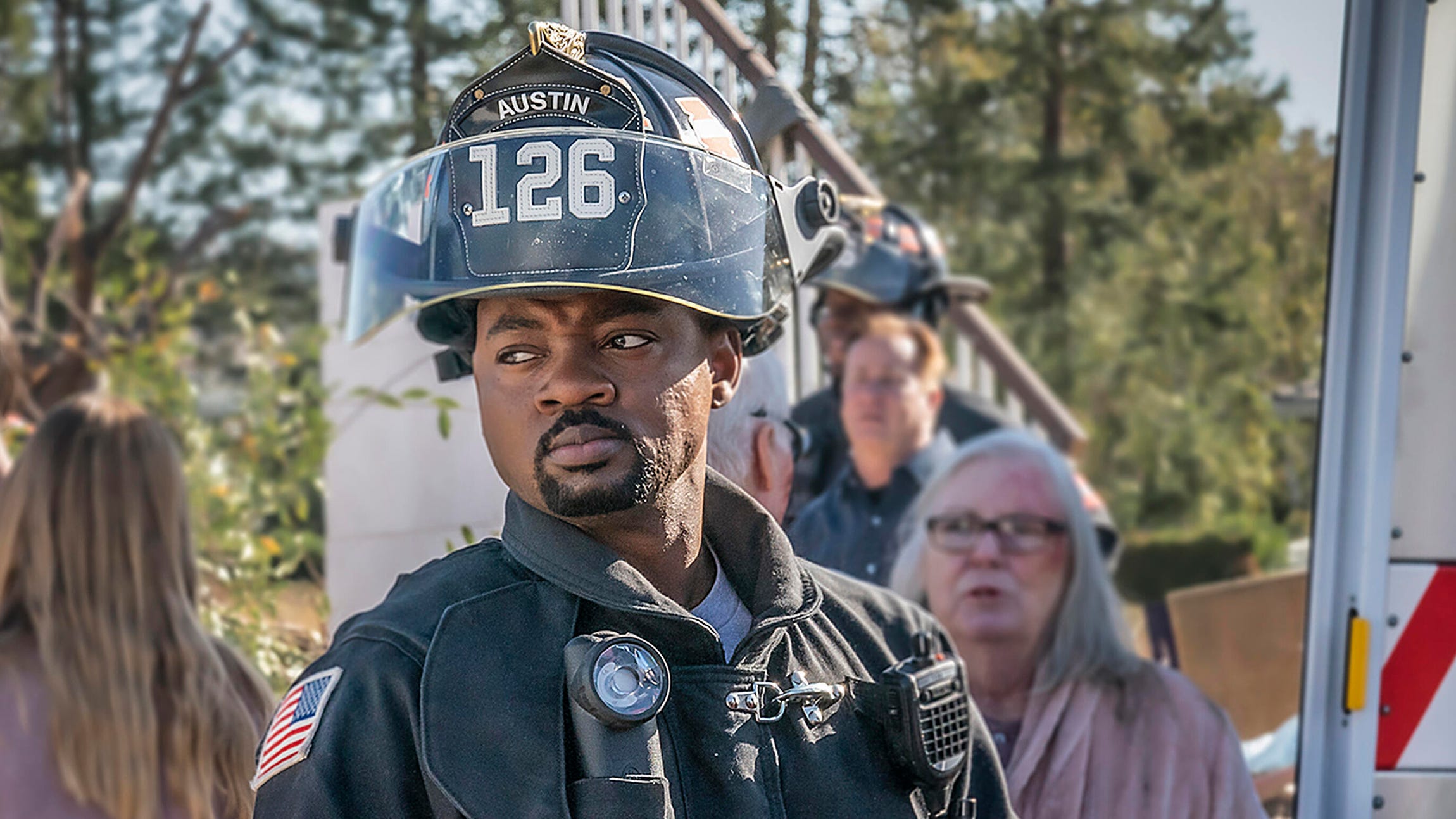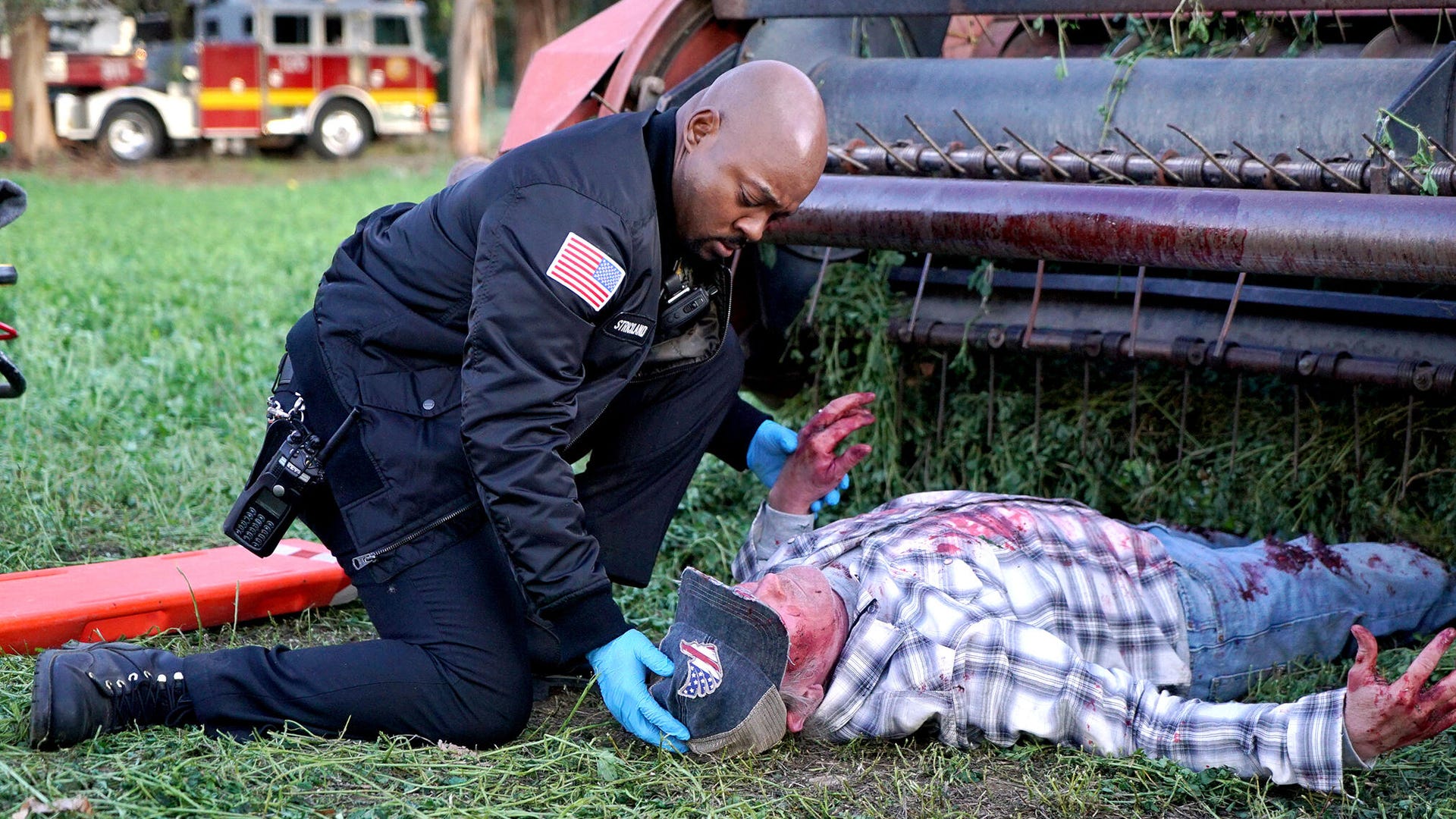
9-1-1 Lone Star's Brian Michael Smith: Black, Trans, and the Face of Pride 2020
The actor talks Pride under quarantine, and what he's learned on his journey
9-1-1: Lone Star on Fox balances a juggling act with one of its firefighters Paul Strickland, played by Brian Michael Smith. Paul, like the actor who plays him, is a transgender man, which is important to Paul's story but just as often, not. Since it's Paul's job to save lives, it's fair to say that if any of us found ourselves in need of his expertise, we would not care about his gender identity. We'd just want him to save our life.
Yet by virtue of being one of very few out trans men on a scripted television show, Paul is a pioneer and role model. A cynical view of 9-1-1: Lone Star is that it could, for some, look like a "liberal agenda" play set in a firehouse; among the squad members is a Muslim woman, Marjan Marwani (Natacha Karam), who fights fires in a hijab; an out gay man, TK (Ronen Rubinstein); a Southern, agnostic white guy, Judd Ryder (Jim Parrack), who is married to a Christian black woman named Grace Ryder (Sierra McClain); a Latino man named Mateo Chavez (Julian Works), and their leader, Capt. Owen Strand (Rob Lowe), a prissy straight dude who can't survive without his fancy skin products. They're an almost aggressively diverse lot, and from a jaded vantage point, they might look like a soup of underrepresented identities put together to engineer tolerance among viewers.

9 Great, Oft-Overlooked LGBTQ Shows to Watch for Pride Month
But each of them is complex, real, and dynamic -- not least Paul, who is both likable and unafraid to not be likable, rather than court people's acceptance. "I enjoy being Paul," Smith told TV Guide via phone. (This interview took place in late May, weeks before protests over George Floyd's murder sparked demonstrations around the world.) "We have similarities and we have elements that are different. I talk a lot; he doesn't. When he speaks he makes sure the language is worthy. He doesn't perform. He doesn't seek to be liked. He's not the kind of person to ask for things he knows belong to him. It does feel good to play him."
Even as Pose has broken barriers for trans visibility on TV, Paul is still a bit of an anomaly: the masculine-presenting trans man. Trans people often say that, even in LGBTQ Pride celebrations, the "T" is often overlooked -- in spite of the fact that it was Black and Latino trans women who started the Stonewall riots that led to the Pride movement. In Paul, viewers get to see a first responder who is also a black man, and a person whose life can sometimes be complicated by the realities of ignorance or transphobia. "Being able to play a character like him, that models what I'd wish I'd seen forever... I do feel a sense of pride."
Smith, who is 37, wasn't always big on Pride; as many other LGBTQ people of color have said, he admits to having felt somewhat alienated from the movement in the past. A native of Ann Arbor, Michigan, Smith was often assumed to be male as a youth; a gifted athlete, he set records in pole vaulting and shot up on the track team and played defensive end and fullback on the boys' football team. Raised in a big loving family surrounded by aunts and cousins as close as siblings, Smith nonetheless found that messages from his family's Southern Baptist roots made understanding his gender identity a challenge sometimes, at least at first. But by his late 20s, after he'd spent time away at school at Kent State, he gained a deeper understanding of who he was and returned home confident about his identity as a trans man. "I never felt like they were going to disown me, but it was a very active resistance," he said, largely due to their fears for him. The somewhat sudden death of a beloved aunt helped his mom and others shift focus towards what was most important. "We all sort of realized we love each other, and that's what mattered."

He went on to pursue acting in New York, and that's where he became more versed in activist work. He marched in his first Pride in 2011, after working at the LGBT Community Center in Manhattan, providing services to adults and young people. "To watch the parade from the kids' eyes -- seeing their sense of safety and security, millions of people cheering them on, I understood it on a whole different level." At the same time, he said, Pride -- often driven by a cisgender, white gay male point of view -- can put what he called "the politics of who gets to be centered" in sharp relief. And now that Pride has become increasingly corporatized, its mainstream packaging can gloss over the fact that there's still much more to do; case in point, the real need for federal legislation prohibiting discrimination on the basis of sexual orientation and gender identity -- legislation that seems to have been pushed to the back burner after same-sex marriage became legal in 2015.

As much as politics must become personal when you're a minority, Smith's primary gig is to act, and it's on 9-1-1: Lone Star where Smith does his most visible work. Paul's identity isn't often an issue but when it is, as it was on Episode 5 ("Studs"), viewers get to see the unique circumstances that arise as a result of him living authentically.
In the episode, Paul provides aid to a woman he meets (in a strip club of all places), and she becomes smitten with him. She stops by the station to drop off some brisket, and they arrange for a date. Ahead of their big night, Paul explains to his male colleagues why he has to tread lightly, explaining that for every one person he tells, two more will know. On their date, sparks fly and it's clear she's interested in more; Paul tells her he has to give her some news, and the scene ends without us seeing him divulge that he's trans. For many of us, this may be the first time we've had to think about the pressure, anxiety, and fears a trans person might experience in a moment like this: particularly since trans people experience disproportionate amounts of violence, such encounters can be dangerous. Smith, who's been married to his wife since 2014, said "Studs" accurately conveyed the complexity of situations he's been in and captured the internal struggle some trans people might have over when to initiate that conversation.

"We're people, we want to be loved like everyone else," he said. "There's this belief that trans people owe disclosure immediately. No we don't," especially before there's even physical intimacy. He said "Studs" illustrated why many trans people prefer online dating, because everyone starts on the same page. "I love that they left the audience to sit there and think, 'How the heck would I have done that?'"
I See You Man: TV Guide's Exploration Into How TV Depicts Manhood Now
Running underneath the surface of the episode was another interesting idea most of us don't think too much about: masculinity and what it means to be a man in the first place. "Studs" shows Captain Strand having an internal crisis because of his hair and inability to perform with a lover; there's a confrontation with an incel; TK and Carlos take Paul to a gay bar. The episode is packed with mini-meditations on manhood, an idea not lost on Smith who said that when he first transitioned, he was so focused on being a man he hadn't really considered what kind of man he'd be. So much of what we consider masculinity can be a performance; playing Paul, a man who is an empathetic, flexible man of few words, gives him and everybody watching another model to consider.
Paul has also given him a lot to be proud of. "At a time like this, we have more time than ever to sit with ourselves," he said. "As I reflect on my own journey, I knew it was important for me to be visible so other people wouldn't have to struggle as I did. I've had a sense of self-determination and strength that have carried me through. Hopefully I can bring that into my work and guide other people to do the same."
9-1-1: Lone Star returns next TV season on Fox. You can catch up with Season 1 on Hulu.
Editor's Note: This interview was conducted in mid-May, before the murder of George Floyd sparked global protests and unprecedented support for the Black Lives Matter and the LGBTQ-focused All Black Lives Matter movements. Text DEMANDS to 55156 to sign Color of Change's petition to reform policing, and visit blacklivesmatter.carrd.co for more ways to donate, sign petitions, and protest safely. All Black lives matter.
